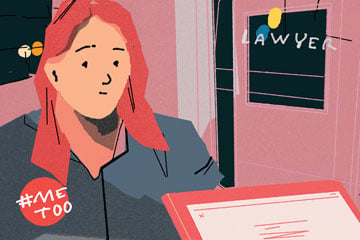A recent article in The Hollywood Reporter caught my eye. The headline announced: “The New #MeToo Economy: Hollywood Lawyers, Crisis PR Pros Seeing ‘Unprecedented’ Uptick in Business.”

Lawyers need to keep their ethical duties in mind with sexual harassment claims.
A recent article in The Hollywood Reporter caught my eye. The headline announced: “The New #MeToo Economy: Hollywood Lawyers, Crisis PR Pros Seeing ‘Unprecedented’ Uptick in Business.”
Ain’t capitalism wonderful? No matter what happens, there’s always a buck to be made. Step right up for new billable-hour opportunities presented by the #MeToo economy.
But maybe we lawyers should tread carefully on this one. Trouble lurks in the weeds. One lawyer specializing in sexual harassment claims told The Hollywood Reporter, “It’s easily a 300-per-cent [increase] . . .
This is unprecedented in volume and duration.” But she cautioned about complaints “where the person is just trying to get on the sexual harassment bandwagon.” Another lawyer interviewed by the newspaper noted that there are many cases where purported victims propose backdoor deals in exchange for silence. He said, “I am aware of many lawyers . . . who have received secret demand letters with disguised threats to make an allegation public unless there is a quick settlement.” The disguised threat letter seems just to be a new version of the old practice, familiar to many long-in-the-tooth lawyers, of paying those who allege sexual harassment to keep quiet about it.
The #MeToo movement is steamrolling across the western world. Like it or not, lawyers are caught up in this profound cultural and social issue. It presents them with ethical conundrums, some familiar, some new. First of all, there may be a problem with the plaintiff. Suppose you are asked to represent a purported victim of sexual harassment who wants to go public — issue statements, call press conferences, initiate civil litigation. But you are skeptical of your client’s story or doubt their bona fides or suspect this is just a self-serving attempt to climb on the sexual harassment bandwagon. What’s the right thing to do? The mere whiff of an allegation or hint of a rumour, jet-propelled by social media, can damage or destroy lives and careers in a trice and — as collateral damage — threaten the existence of important institutions (businesses, political parties, theatre companies). Do you want to be part of that? Suppose your client, more interested in money than publicity, asks you to send one of those backdoor disguised threat demand letters. Isn’t that a bit unsavoury? Doesn’t it smack a little of extortion?
The plaintiff problem in sexual harassment cases is a new expression of an old quandary. Should lawyers evaluate their clients’ motives or the broader social consequences of proceeding with litigation and temper their advice with those considerations in mind? Almost every lawyer, I think, would answer in the negative, even if they found their client’s intentions reprehensible and conduct odious. Most lawyers believe that everyone is entitled to vigorous legal representation within the boundaries of the law. Our system, they will tell you, depends upon it. There is another way of looking at things. Ten years ago, I got into trouble in these pages when I wrote: “a lawyer, as a well-educated creature of his community, should take into account the values and well-being of that community when he does his work.” I had in mind lawyers who shared some responsibility for the 2007/8 financial meltdown. That column garnered a lot of criticism. One distinguished lawyer wrote, “I wonder if your view of lawyer morality would be the same if you needed to retain a lawyer.” (A low blow, I thought.) Another correspondent ranted on about “single issue fanatics.”
I didn’t think it was so radical to suggest, as many bar association rules of conduct state, that a lawyer “should not knowingly assist or permit the client to do anything that the lawyer considers to be dishonest or dishonourable.” I still don’t. Vigorous representation, yes, but, sometimes, vigorous representation can go a step too far. Readers will remember that, as a by-product of the Jian Ghomeshi affair, some argued that a lawyer defending a person accused of sexual assault had social obligations that mitigated their responsibility to the accused, obligations that included not embracing myths and stereotypes about women and sex.
Then there’s the flip side, the dilemma of the defendant. What advice do you give to someone who is accused of sexual harassment, particularly if the accusation seems weak? Should they fight back, all guns blazing, sue for wrongful dismissal and defamation and whatever else, try to cow their accuser and rescue their reputation? Or is it better, as social media does its gruesome hatchet job, to recognize the apparent hopelessness of the situation, no matter what the facts are, to accept defeat and slink away in silence, as so many of those who are accused seem to do even if the allegations don’t seem particularly credible? Does it matter whether you, the lawyer, thinks the accusations about your client are overblown or false?
I don’t understand why most of those recently accused of sexual harassment haven’t fought back. Maybe it’s because they are completely compromised (particularly when there are multiple accusers) and fighting back seems futile. Better to move to Patagonia and start a new life. Maybe it’s because they can’t afford to hire a lawyer (although some lawyers may take these cases on a contingency basis). Maybe it’s just because they have no stomach for a public fight, which could keep the story alive and further damage their reputation. Savvy libel lawyers often advise that the game isn’t worth the candle.
It’s difficult to know what to do, but here’s what I think. Don’t represent someone who wants to go public with highly dubious claims of sexual harassment that will destroy lives and careers. Don’t engage in backdoor threats of publicity designed to extort money. Do put the accused to the test by urging a vigorous defence and counterattack — that’s if they truly consider the accusations about them to be false.
Philip Slayton’s latest book, How To Be Good: The Struggle Between Law and Ethics, was published in October.











